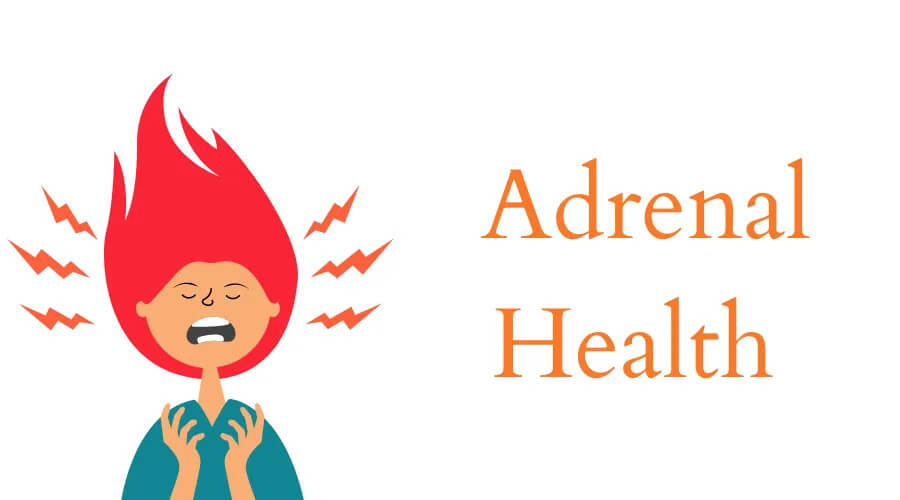
Have you heard the term “adrenal fatigue” or been diagnosed with it? Over the last several years, the medical community has come to realize that this isn’t really the right terminology – the HPA-Axis dysfunction is more appropriate because it involves far more than just the adrenal glands.
“Adrenal fatigue” can include fatigue or exhaustion believed to be caused by the adrenals wearing out from cortisol imbalance after a history of acute or chronic stress. Research has shown the problem involves more than just the adrenal glands – and doesn’t always cause fatigue or exhaustion.
Let’s take a deeper look at adrenal health and HPA axis dysfunction, what the condition means for patients, the symptoms they may be experiencing, how you can test for it, and the treatment options available.
What is HPA Axis Dysfunction?
It’s important to understand what the HPA axis is and what parts of the body it refers to.
- Hypothalamus – part of the brain, located at the base near the pituitary gland, plays an imperative role in regulating hormone production. These hormones then control various aspects such as body temperature, emotions, appetite, and sleep. The hypothalamus connects the endocrine system to the nervous system.
- Pituitary Gland – sometimes called the “master gland,” is the center of the endocrine system. It takes signals from the hypothalamus, makes necessary hormones, and directs other glands and organs throughout the body.
- Adrenal Glands – are located just above the kidneys, are in charge of making necessary hormones such as adrenaline and cortisol.
These three components work together in line to perform many essential functions throughout the body, including the regulation of energy and stress levels, metabolism, and immune response. All work together and rely on each other to function properly. Any imbalances in these systems can cause dysfunction in a wide range of body systems.
High or low levels of hormones can cause wide-ranging effects like:
- Fatigue or exhaustion
- Unexplained weight gain or loss
- Poor sleep quality (even if you’re sleeping, you don’t wake feeling rested)
- Trouble sleeping (falling asleep or staying asleep)
- Poor immune response
- Difficulty handling and/or managing stress
- Brain fog (not be able to think clearly or remember things)
- Difficulty concentrating
- Increased anxiety
- Depression
- Sugar or salt cravings
- Inflammation
- Poor circulation
- Brittle nails (that break easily)
- Hair loss (sometimes resulting in bald patches)
When things are going well, this axis keeps everything balanced and happy. However, when we are overworked, overused, and and lacking rest and recovery, we end up running on stress hormones.
By then, your body is stuck in the fight or flight response. You might feel wired and tired at the same time. You might have an afternoon energy slump. You might lose your appetite but snack all night. You might find you have to write everything down or you’ll forget. You might experience low libido. Or you may find that even when you’re tired, you get a second wind late at night that keeps you up.
It’s truly a vicious cycle.
What Causes HPA Axis Dysfunction?
The most common cause of HPA axis dysfunction is chronic stress – whether emotional, physical, psychological, chemical, or inflammatory. When the body constantly releases stress hormones, it doesn’t have enough time to relax, rest and rejuvenate. This can occur in the case of chronic stress, emotional trauma, unmanaged anxiety, blood sugar dysregulation, toxin exposures, an imbalanced microbiome, chronic infections, over-exercising, or even poor diet.
People who live in persistent high-stress situations due to high-pressure jobs, family drama, or money worries are all at risk for experiencing HPA axis dysfunction systems.
HPA Axis Repair
HPA axis dysfunction is reversible with lifestyle changes, dietary changes, and proper supplementation.
Lifestyle Changes
The most important lifestyle change you’ll need to make is to reduce your stress level. Identifying the source of the stress is the first step – and then the mitigation plan looks different for each person. Here are a few things to try:
Practice Yoga or Meditation
Meditation and/or yoga practice, and even learning breathing techniques can help keep your stress response under control and manage stress in a healthy way.
Eliminate Stressors
Cut back on or fully eliminate any source of stress that you can. This could mean getting a new job, spending less time with certain people, or simply putting you higher on your priority list (self-care).
Make Sleep a Priority
Prioritizing a full seven to nine hours of quality sleep each night can be difficult for some, but it’s critical to make sleep a priority in your life. Physical rest will help your body recover, and will do wonders for your mental state. Using sleep trackers or apps can be tremendously valuable for assessing the quality and quantity of sleep you’re getting.
Maintain a Balanced Diet
Nutrients matter. The food you eat plays a major role in how your body can repair and function regularly. This is not about dieting, but rather focusing on eating natural whole foods, avoiding processed foods, sugar, and flour as much as possible. And maintaining good hydration, as well.
You may also avoid or limit alcohol and caffeine. Alcohol is a depressant, caffeine is a stimulant. Both can affect hormones and the overall inflammation in the body.
Exercise
Exercise can be a big stress reliever – when done properly. Get up and get your body moving for at least 30 minutes each day. It doesn’t have to be rigorous or difficult. Focus on finding something you enjoy or at least don’t dread. It may be walking, hiking, biking, kickboxing, dancing, or some resistance training. Work your muscles, increase your circulation, breathe deeply and relax your mind. Exercise improves sleep and can lower your blood sugar levels. Use caution not to overtrain though – overdoing exercise is a stressor!
Supplements Which Support HPA Axis Function
Adaptogens are herbs that can help to counteract the effect that stress has on our bodies by working to stabilize the hypothalamus, pituitary gland, and adrenal glands for better resilience, repair, and homeostasis.
Some adaptogens are stimulating so that our bodies can harness extra strength, energy, and clarity for a longer period of time. Some adaptogens are calming and can help reduce anxiety. All adaptogens help the body respond more normally to stress, and return to a sense of calm and wellbeing faster. It’s important to work with a practitioner to select the proper adaptogen for YOU – they can make your situation worse if used incorrectly.
Why Some Doctors Are Hesitant to Diagnose
HPA axis dysfunction is a more accepted diagnosis than adrenal fatigue, but because most primary care physicians focus on treating symptoms individually rather than looking for the underlying cause of the dysfunction.
A most holistic approach will help you identify the root cause so that you can repair that unique situation for true healing. Functional testing is the best way to know for sure what is going on with your body – so that you can get to the real remedy! These tests are non-invasive with either saliva or urine collections done at home.





















0 Comments